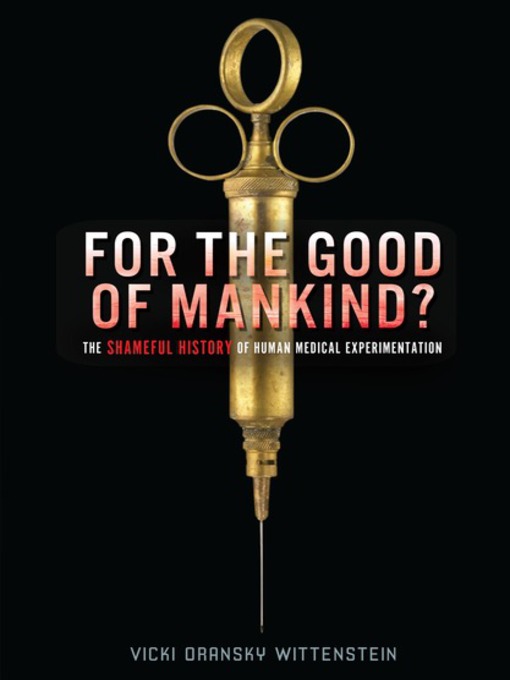
For the Good of Mankind?
The Shameful History of Human Medical Experimentation
فرمت کتاب
ebook
تاریخ انتشار
2013
Lexile Score
1160
Reading Level
8-9
ATOS
9.5
Interest Level
9-12(UG)
نویسنده
Vicki Oransky Wittensteinشابک
9781467716611
کتاب های مرتبط
- اطلاعات
- نقد و بررسی
- دیدگاه کاربران
نقد و بررسی

September 1, 2013
Gr 8 Up-This chilling narrative exposes the history of human medical experimentation, much of which has occurred in the United States. By examining the use of humans as guinea pigs in medical research since the 1700s, Wittenstein explains the evolution of modern regulations, review boards, and organizations focused on ethical treatment of patients and approved research procedures. While the exploitation of unsuspecting orphans and pregnant women or intentionally withholding established medical cures from sick patients may seem gruesome, the narrative is successful at presenting both sides of the issue: the patient whose rights are being violated and the doctor intent on furthering science. Of particular note is the discussion of stem-cell research, which brings these historical medical controversies to light in a modern setting. The black-and-white photographs present a human face to these experiments and, if used in the classroom, this title will spark an educated debate. A "Critical Analysis" section presents questions for readers to consider and discuss while sources for additional information list print, media, and websites that will appeal to a wide variety of readers. This title is an important addition to public and school libraries. It will pair well with books on topics ranging from medicine and history to human rights and law.-Meaghan Darling, Plainsboro Public Library, NJ
Copyright 2013 School Library Journal, LLC Used with permission.

September 15, 2013
Readers may think twice about going to their next doctor appointment after reading this creepy, unsettling account of human medical experimentation. In a dramatic, engrossing narrative, Wittenstein describes many cringe-inducing examples of the ways doctors have exploited the marginalized, powerless and voiceless of society as human guinea pigs over the centuries. African-Americans, indigenous peoples, concentration-camp inmates, orphans, prisoners, the poor, the mentally ill and disabled have been subjected to injections of lethal diseases, ingestion of radioactive materials, exposure to poisons, surgical procedures and other horrors. Some experiments did lead to important discoveries and breakthroughs, but readers are challenged to consider the costs of violating individual rights for the cause of advancing medical knowledge. Drawing on a variety of sources, including contemporary newspaper articles, medical journals and, in at least one case, a personal interview, the author lays out this troubling history. She also documents the evolution of medical ethics and the establishment of procedures for things like clinical trials for new drug treatments. Sidebars offer additional information, filling in the cracks on related issues such as eugenics and thalidomide babies. Photographs, some not particularly well reproduced, illustrate the account. A harrowing, often gruesome, exploration of some of the darkest moments in medical history. (source notes, bibliography, suggestions for further reading, index) (Nonfiction. 12-18)
COPYRIGHT(2013) Kirkus Reviews, ALL RIGHTS RESERVED.

October 1, 2013
Grades 8-12 More than just a historical treatment of human experimentation, this title also offers an introduction to timely related issues involving biospecimens, stem cell research, and genetic enhancement. Archival photographs of test subjects, including prison and concentration camp inmates, accompany chilling tales of torturous experimentation. How do respect, beneficence, and justice, as described in the U.S. Department of Health and Human Services' Federal Policy for the Protection of Human Subjects, and The Common Rule that department published in 1991 fit with the ongoing practice of using humans as guinea pigs? Writing from a mindful, balanced perspective, Wittenstein keeps the essential ethical questions about rights of the individual, the advancement of science, and the evolution of informed consent in clear view. Chapter notes offering further critical analysis focus mainly on bioethical issues, while the source notes, a selected bibliography, lists of additional resources, and an index extend this substantive, informative resource. Researchers may find additional suggestions for further exploring the topic on the publisher's website.(Reprinted with permission of Booklist, copyright 2013, American Library Association.)

























دیدگاه کاربران